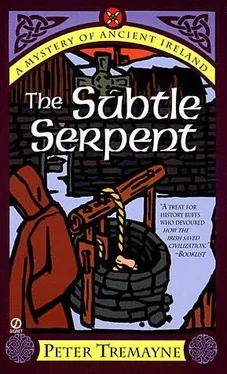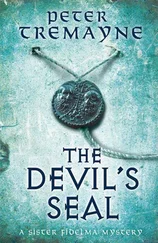Peter Tremayne - The Subtle Serpent
Здесь есть возможность читать онлайн «Peter Tremayne - The Subtle Serpent» весь текст электронной книги совершенно бесплатно (целиком полную версию без сокращений). В некоторых случаях можно слушать аудио, скачать через торрент в формате fb2 и присутствует краткое содержание. Жанр: Исторический детектив, на английском языке. Описание произведения, (предисловие) а так же отзывы посетителей доступны на портале библиотеки ЛибКат.
- Название:The Subtle Serpent
- Автор:
- Жанр:
- Год:неизвестен
- ISBN:нет данных
- Рейтинг книги:3 / 5. Голосов: 1
-
Избранное:Добавить в избранное
- Отзывы:
-
Ваша оценка:
- 60
- 1
- 2
- 3
- 4
- 5
The Subtle Serpent: краткое содержание, описание и аннотация
Предлагаем к чтению аннотацию, описание, краткое содержание или предисловие (зависит от того, что написал сам автор книги «The Subtle Serpent»). Если вы не нашли необходимую информацию о книге — напишите в комментариях, мы постараемся отыскать её.
The Subtle Serpent — читать онлайн бесплатно полную книгу (весь текст) целиком
Ниже представлен текст книги, разбитый по страницам. Система сохранения места последней прочитанной страницы, позволяет с удобством читать онлайн бесплатно книгу «The Subtle Serpent», без необходимости каждый раз заново искать на чём Вы остановились. Поставьте закладку, и сможете в любой момент перейти на страницу, на которой закончили чтение.
Интервал:
Закладка:
‘Please begin, Fidelma. Would you prefer wine or mead?’
Silver goblets were filled with imported red wine but jugs of local mead were also placed on the table. She saw that brother Febal selected this rather than wine. There was a choice of dishes: ox-meat, mutton and venison. There were fish dishes, goose eggs and a dish even of rón or seal meat. It was a dish that was once popular but now few people ate it. A story told that a family in the west of the country was once metamorphosed into seals by a druid and now no one would eat seal meat in case they were eating their own relatives.
Fidelma helped herself to some venison cooked with wild garlic, some barley cakes and parsnip.
‘Seriously,’ Adnár was saying, ‘how is your investigation? Have you discovered the identity of the headless body?’
‘Not for sure,’ replied Fidelma, sipping at her wine.
Torcán’s glance was searching.
‘That means that you have some suspicion as to who it is?’
Fidelma pretended her mouth was too full of food to answer.
‘Well, I know who I believe did it,’ muttered Brother Febal.
The sallow-faced Olcán waved his knife towards Febal.
‘You have already made that clear to Sister Fidelma. Certainly the Abbess Draigen is not a person who has inspired your affection.’
‘She inspires it in her daughter,’ Fidelma observed quietly.
Brother Febal immediately caught the inflection.
‘So you have been talking to Lerben?’ He seemed unperturbed. ‘Well, she is but hewn of the same tree as her mother. Liars, both of them!’
‘Is she not also hewn of the same tree as her father?’ Fidelma asked with an innocent expression.
Brother Febal was about to retort, then seemed to catch himself. He tried to interpret Fidelma’s implacable expression.
‘If she has been accusing me …’ he began and his face flushed angrily.
‘Of what would she accuse you?’.
Brother Febal shook his head negatively.
‘Nothing. Nothing. The girl is simply a compulsive liar. That is all.’
‘And you still say that her mother prefers women to men? You stand by that accusation? And the accusation of an unnatural relationship between mother and daughter?’
‘Have I not said so?’
‘No one else in the abbey would agree with you. Not even Sister Brónach whose name you conjured as your witness.’
‘None of those at the abbey have any guts to go against Draigen, especially Brónach. She is a self-made martyr!’
Fidelma noticed that Torcán was regarding Brother Febal with a curious expression. It was Olcán who lightened the sudden tense turn of the conversation.
‘Personally, and by the sound of it, I believe the killer is some madman. They are many tales of strange mountainy men who waylay and slaughter people. What sane person would decapitate a head from the body?’
‘Then you must believe our forefathers were insane.’ Torcán’s tone was serious but he was smiling as he spoke. ‘Years and years ago it was considered essential to take the head from a slain enemy.’
‘I have heard of that ancient custom,’ Fidelma observed. ‘Do you know much about it?’
The son of the prince of the Ui Fidgenti selected another piece of meat with his knife and gave an affirmative gesture.
‘It was once a warrior code. Great warriors, in the aftermath of a battle, would remove the heads of their slain enemies to hang them from their chariots and drive triumphantly back to their fortresses. Didn’t the hero Conall Cearnach vow never to sleep unless he could do so with the head of an enemy under his foot?’
‘Why would they do that?’ Olcán demanded. ‘Remove the heads of their enemies? It was as much as one could do to survive in battle without wasting time on such a fruitless exercise.’
It was Fidelma who supplied the answer.
‘In the old days, before the coming of the Faith, it was thought that the soul of a person was to be found inside the head. The head was the centre of intellect and all reason. What else could produce such thoughts other than a soul? When the body died, the soul remained until it journeyed to the Otherworld. Am I not right in this, Brother Febal?’
Brother Febal started at being addressed by her in an apparently friendly manner and then nodded reluctantly.
‘That was the belief, so I understand. Until recently, a sign of showing respect and affection among us was to lay one’s head on the bosom of the person to be greeted.’
‘But why did warriors remove the heads of their enemies?’ demanded Olcán.
‘It was like this,’ Torcán explained, ‘among the ancient warriors they felt that if the heads of their enemies were removed, they would capture the soul. If their enemy was a great warrior, a great champion, some of that greatness would pass down to them.’
‘A primitive idea,’ muttered Olcán.
‘Perhaps,’ Torcán conceded. ‘Instead of the tales of the saints and the new Faith, you should listen to the tales of our ancient heroes, like Cúchullain who rode into Dun Dealg with hundreds of heads adorning his chariot.’
Adnár admonished his guests.
‘This is hardly a conversation fitting for the presence of a woman.’
‘It was a practice that even our great women warriors took part in,’ pointed out Torcán, oblivious to the hint which Adnár was giving him.
‘You seem to know much about this,’ Fidelma observed.
‘Tell me, Torcán, would one even remove the head of someone who had, for example, been a murderer?’
Torcán was surprised at the question.
‘What makes you ask that?’
‘Indulge my curiosity.’
‘In the old days it did not matter so long as the person was seen as a great warrior, champion or leader of their people.’
‘So, if someone, imbued with the old ways, encountered their enemy, and saw their enemy as a murderer, they could easily remove the head as a symbol?’
Olcán’s thin features broke into a smile.
‘I begin to see where the good sister’s questions are leading.’
Brother Febal had snorted indignantly and sunk his nose into his mug of mead.
Torcán was looking puzzled.
‘It is more than I do,’ he admitted. ‘But, in answer to your question, it is possible. Why do you ask?’
‘She asks because she suspects that the headless corpse and the decapitated Sister Síomha may well have been the victims of some ancient head-hunting ancestor of ours!’ sneered Brother Febal.
Fidelma was composed and did not rise to the bait of the religieux.
‘Not exactly, Febal. It is clear however that the killer, whoever they are, put some symbolism into the methods of killing.’
Adnár was leaning forward on the table with interest.
‘What symbolism?’
‘That is what I want to find out,’ replied Fidelma. ‘It is clear also that the killer wanted whoever found the corpses to know and appreciate that symbolism.’
‘You mean that the killer is actually giving you clues to his means and motive?’ asked young Olcán wonderingly.
‘His or her motive,’ corrected Fidelma gently. ‘Yes. I now believe that the way the corpses were left was meant as a message to those who found them.’
Brother Febal banged down his mug.
‘Nonsense! The killings are part of a sick mind. And I know who has the sickest mind on this peninsula.’
Adnár sighed unhappily.
‘I cannot argue against that assessment. Perhaps these symbols, of which you speak, Sister Fidelma, are but some trick to distract you in your investigation? Some ruse to make you follow a path which does not lead anywhere?’
Fidelma bowed her head in consideration of the point.
‘It may well be,’ she acceded after a moment. ‘But knowing the symbolism will, I believe, eventually lead to the perpetrator whether it is intentional or unintentional. Andfor this information on decapitation, Torcán, I am much indebted.’
Читать дальшеИнтервал:
Закладка:
Похожие книги на «The Subtle Serpent»
Представляем Вашему вниманию похожие книги на «The Subtle Serpent» списком для выбора. Мы отобрали схожую по названию и смыслу литературу в надежде предоставить читателям больше вариантов отыскать новые, интересные, ещё непрочитанные произведения.
Обсуждение, отзывы о книге «The Subtle Serpent» и просто собственные мнения читателей. Оставьте ваши комментарии, напишите, что Вы думаете о произведении, его смысле или главных героях. Укажите что конкретно понравилось, а что нет, и почему Вы так считаете.











